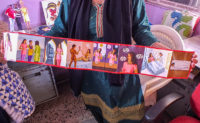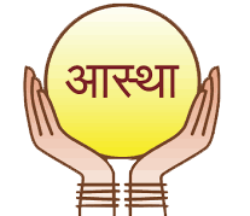
A staff member from our Malvani CBO with a pictorial resource used to educate community members on the risks of practicing unprotected sex
Sex work is as diverse and varied as the workers themselves; different forms have different needs and risks. Through having 13 community based organisations (CBOs) spread throughout Mumbai, Thane and Pune, Aastha Parivaar is well set to cater to the communities it supports.
Aastha Parivaar’s Malad-based CBO, Vishwas Sehat Mahila Mandal (VSMM), cares for bar-based, home-based and street-based sex workers; the needs of which are all varied. In order to care for the health of their community as best as possible and prevent the spread of HIV, VSMM has developed a system to determine the individuals most at risk.
VSMM defines those being at the highest risk of contracting HIV or other sexually transmitted infections are: between the ages of 18-24, are new to the profession, have 10+ clients per week and/or engage in unprotected sex in exchange for a higher fee. Whilst VSMM provides monthly health camps and check ups for all of the 1532 sex workers they support, extra resources are poured into connecting with this segment of the population.
Bar girls, who form the bulk of the VSMM community with 750 members out of 1532 being bar-based, are at risk more than many realise. This form of sex work involves dancing and performing an escort service from purpose-run bars. Bar girls typically engage with less clients per week than brothel-based sex workers as they attract a higher paying clientele who choose to spend many hours with the worker.
The often overlooked risk of bar-based sex work is the influence of alcohol. Clients will buy the women drinks, which they will often not refuse for fear of upsetting and potentially losing a client. This is typically a deliberate attempt by the clients to intoxicate the sex worker enough that she will not notice that he is not wearing a condom, and is therefore putting her at risk of contracting HIV or other STIs.
Due to this, it is an all too common occurrence where bar-based sex workers are diagnosed with HIV and remain in denial due to their adamance that they have never engaged in unprotected sex. An added complication for VSMM is that many bar girls attend private HIV testings arranged by the bar owners instead of Aastha Parivaar testing. Commonly, the privately arranged tests are not hospital-standard and are therefore less accurate. Simultaneously, it is harder for VSMM to keep track of positive HIV diagnoses as they do not have access to the private records. Due to the difficulty of tracking, deaths and migration, the number of KP supported by VSMM has decreased from 1734 to 1532 in recent years.
The combination of alcohol-induced unprotected sex, denial of positive diagnoses and private testing makes bar girls particularly vulnerable to contracting diseases. VSMM therefore must make attendance as enticing as possible. At their monthly health camps, for example, they organise street plays and other activities to make the regular check ups a fun and inclusive day, rather than a chore. They also provide the workers with small gifts such as cleaning products and lip balm and toys and clothes for their children; with regular attendees occasionally receiving an extra small gift.
On top of this, VSMM offer courses in financial literacy and aid in obtaining official identification for the sex workers. In India, as with many countries in the world, an I.D. card is required to open bank accounts and rent hotel rooms, however many of the women in the community are migrants and therefore do not have their own. With help from VSMM and Aastha Parivaar to register for an I.D. card, women are empowered to open a bank account and learn how to save money for their future. Additionally, having a form if identification means they are able to continue to do their job on their terms as they can take bar clients to hotel rooms of their choice.
Finally, the FHI Linkages staff trained VSMM on the risks of HIV and provided them with ample resources to teach the KP about safe sex and treatment. These resources are also used at health camps and present information using colourful diagrams and pictures which can be easily understood regardless of literacy level. This ensures the sex workers are aware of the implications of ignoring a positive diagnosis.
The approach of giving women the materials and skills required to manage a better quality of life whilst continuing to do sex work, as well as enabling them to move to a new profession if they so choose, has been very successful. VSMM is respected in the community, despite the many challenges they face in preventing and treating HIV and other health concerns. One bar-based sex worker was diagnosed with HIV approximately two years ago, but refused to acknowledge it or enrol for antiretroviral therapy (A.R.T.). Recently, through word of mouth in the community, she encountered Aastha Parivaar and the work they do. She reached out to the organisation and has since been regularly attending treatment with the help of VSMM and Aastha Parivaar.

A member of VSMM with the many planning and tracking sheets the CBO uses to care for their community
Despite the major progress made, the community is increasingly plagued by problems. Due to the high income and alcohol involved in bar work, the harmful impacts of drugs and alcoholism is creeping its way into the lives of the KP, and in some cases, their children. VSMM are aware of this and attempt to offer counselling, however those suffering from alcohol or drug addiction are unwilling to admit they have an addiction. As this is not the core focus of VSMM, they lack the resources to pursue those who do not voluntarily attend alcohol rehabilitation therapy.
As always, there is no simple solution due to limited NGO funds and the unwillingness of many workers to switch profession or acknowledge the very real risks of HIV. That being said, VSMM’s excellent use of resources and clear planning (which can be seen in the extensive and detailed planning and goal setting sheets plastered over the majority of the office wall space), points towards an optimistic future of education, health and empowerment.
